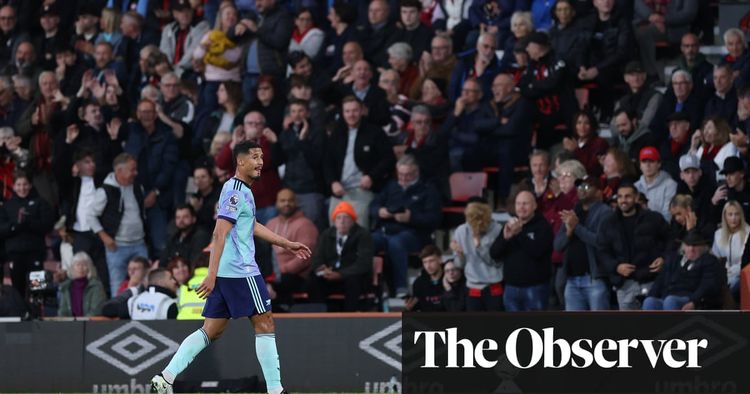Arsenal’s sloppiness calls into question whether they are serious contenders | Jonathan Wilson

Despite what Arsenal supporters might grumble about conspiracies and refereeing choices, the match wasn't truly about those factors. It wasn't just about William Saliba's red card in the first half or the penalty given in the second half, even if those rulings played a significant role. The real issue lay in Arsenal's remarkable tendency to undermine themselves—faulty passes, a lack of discipline, and the unclear thinking that often plagues the team during crucial times.
It’s possible that the expectations placed on the team are too high. Last season, they managed to gather an impressive 89 points, which is quite remarkable historically. In the past, teams were given some leeway for occasional mistakes. However, times have changed. With 90 points now seen as the bare minimum needed to clinch the championship, teams cannot afford to drop points if they want to be taken seriously as title contenders.
Arsenal has once again fallen into their familiar pattern of complicating things for themselves. While thrilling comebacks, last-minute goals, and heart-stopping victories can be exciting, championship-winning teams typically secure a number of straightforward wins, where they collect points with ease and minimal stress. Since their opening match victory against Wolves, Arsenal hasn't recorded any of those kinds of matches. Prior to Saturday, they had played better than their opponents in all games except for the draw against Manchester City, yet they continuously find themselves in stressful situations—whether it's players getting red cards, missing opportunities, or giving away silly goals. It seems every point they earn comes with a lot of drama. Challenges seemingly arise from nowhere, which is rather typical, considering this is Arsenal and it's become part of their identity.
Arsenal was bound to struggle with creativity in the absence of Martin Ødegaard and Bukayo Saka. While missing Saka's inswinging corners isn't as drastic as Stoke losing Rory Delap's long throws, it’s still a notable loss. This became clear when Declan Rice took the first three corners of the match, all of which were outswingers; only 4.5% of Arsenal's corners over the last three years have been outswingers. Initially, Arsenal seemed to manage without them, as Bournemouth posed no real threat either. The first thirty minutes passed with little action, the game mirroring the dullness of the autumn sky. However, everything changed when Leandro Trossard made a baffling pass behind his own defense, leading to William Saliba pulling down Evanilson and eventually getting a red card.
Nothing about it added up. What was Trossard thinking – where was he trying to pass the ball? Why did Saliba foul when Evanilson had so much space left to run into, and he might have caught up with him anyway? Even if Evanilson had scored, with still an hour to go, Arsenal would have had a better chance of winning a game from 1-0 down with 11 players rather than being 0-0 with just 10. Plus, why did the referee, Robert Jones, only show a yellow card for such a clear denial of a goalscoring opportunity? The rules don’t say anything about how likely the striker is to convert that chance.
This was the third red card Arsenal received this season, and the first that wasn't the result of a second yellow for kicking the ball away. They've now gone three games without a victory, and these unnecessary red cards are proving to be a significant problem for them.
Despite the fans' shouts of "cheat" and claims of corruption, Mikel Arteta, who is typically quick to criticize referees, appeared surprisingly calm in this situation. Declan Rice expressed frustration, mentioning that their team has "shot themselves in the foot" on three occasions this season. Mistakes often come with consequences. This loss was so self-inflicted that the rule leading to Saliba's red card was partly established in response to past incidents, including a notorious foul by Willie Young on a young Paul Allen during the 1980 FA Cup final.
Things took a turn for the worse when Jakub Kiwior made a poor backpass that allowed Evanilson to be brought down by David Raya, leading to a penalty and their second goal. Two awful backpasses, two fouls, a red card, and a penalty—all completely preventable. This was even before considering the missed golden opportunities by Mikel Merino and Gabriel Martinelli. To make matters even more frustrating, Bournemouth's first goal came from a corner, which just added insult to injury.
This team appears to struggle when facing challenges. They failed to maintain their advantage after Rice got sent off with 41 minutes left in the match against Brighton. Even when they fought hard to defend their lead with just 10 players against Manchester City, it ultimately wasn’t sufficient. The same issues keep repeating: easy goals given away, missed chances, and baffling choices. Rice mentioned a sense of "naivety," but no matter what causes this lack of focus, if Arsenal aims to win the championship, it needs to be addressed.
Today’s champions must show remarkable consistency, which is already a significant challenge. It becomes even tougher when they lose points simply due to avoidable mistakes.









































